The Herald’s continuous investigations into the Accra High Court’s order for the Food and Drugs Authority (FDA) to pay a whopping GH¢94 million to Tobinco Pharmaceuticals Ltd. for the unlawful destruction of unexpired drugs belonging to the company have unearthed more dirt confirming that Tobinco is not deserving of any amount.
A crucial document in the custody of The Herald, dated February 6, 2017, had the current Chief Executive Officer (CEO) of the FDA, Delese Darko, insisting that Tobinco’s conduct was criminal by the law, specifically the Public Health Act 2012, Act 851, but it remains unclear, why she did not enter the witness box to testify in favour of the authority over the 2013 incident.
Mrs Darko’s damning letter was in response to one written to her by Akufo-Addo, Prempeh & Co, the law firm of the President, Nana Akufo-Addo, and dated January 31, 2017, in which Dr Stephen Kwabena Opuni, was severely condemned for taken action against drugs imported into the country by Tobinco Pharmaceuticals Ltd owned by Samuel Amo Tobin.
Akufo-Addo, Prempeh & Co, through one Alex Mantey Osei, acting as the lawyers of Tobinco Pharmaceuticals Ltd, resurrected the 4-year standoff between FDA and Tobinco 24 days after the inception of the Akufo-Addo administration, accusing Dr Opuni of savagery and “brute harassment” of Tobinco officers in the “unlawful destruction of its imported medicines.”
Tobinco’s lawyer in their letter in which they demanded compensation stated that Dr Opuni had “categorically threatened to bring our client’s CEO down”, and “finish him like Semanhyia”, etc..”
However, in her response to the letter, Delese Darko, who, per documents available to The Herald, revealed was the brain behind the 2013 detection of Tobinco’s unregistered products, fired back on behalf of the FDA, saying it “denies the allegation contained therein, and would say in response that its actions and activities have not occasioned your client and loss during the period in question”.
“The FDA would like to put on record, for the avoidance of doubt, that your client, in blatant disregard of national law, and in particular, the Public Health Act 2012 (Act 851), endangered the health and safety of Ghanaians, and especially, the health of Ghanaians Children, by importing, distributing and offering for sale fake, substandard and unregistered medical products”.
She told the lawyer to “please note that the law criminalises the above conduct and empowers the FDA to act swiftly and timeously in such instances to avert any danger posed to the public”.
“We are of the firm belief that the FDA, acting through its officers, acted properly, diligently, in accordance with due process and in the reasonable belief that their failure to so act would jeopardise public health and safety.”
“We wish to state emphatically that the FDA, is not indebted to your client in any way, whether by way or contract or tort or at all”, concluded Mrs Dako’s letter. She was then acting as CEO of the FDA.
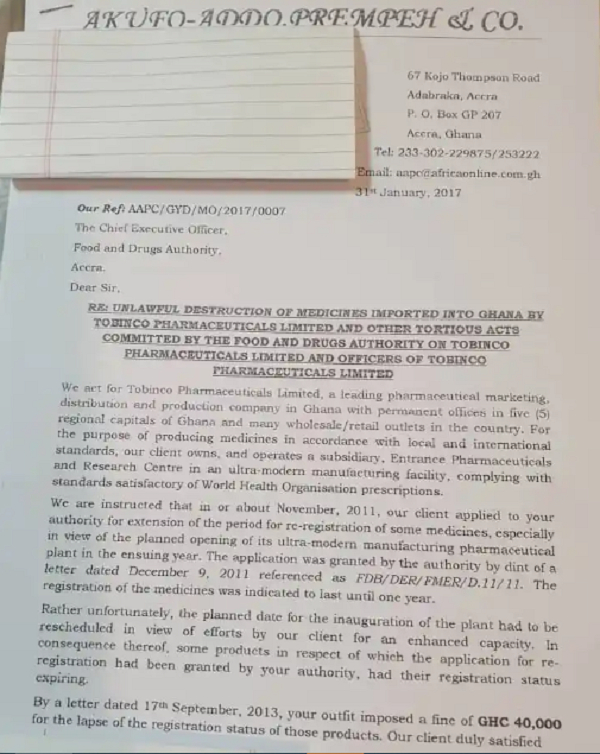
Meanwhile, analysts have waded into theGH¢94 million awarded to Tobinco, saying it stifles the work of the FDA.
It was explained that the FDA has always safely disposed of unregistered and or expired products pursuant to section 132(2) without court orders and has done so to date. It does so with guidelines pursuant to section 148(2) (f) – guidelines for the destruction of drugs.
The judgement, it is suspected will open the pandora’s box for all disposals made without the order of a court since the FDA’s inception to attract judgments, following the court’s orders as captured by the entry of judgment.
The FDA (acting through authorised officers) has powers under section 135 titled to enter any premises where an officer believes that a regulated product is preserved, stored or conveyed; (d) seize and detain for the period that the officer considers necessary an article by means of or in relation to which it is believed a provision of Act 851 has been contravened.
The FDA’s power includes the power to detain unregulated items on the premises of the proprietor or importer. Section 132(1) – the FDA has authority to order the closure of premises.
Hence, the public must be interested in knowing whether the FDA, acting through its officers in the period under review, acted in the interest of public health and safety or unlawfully, as described by the entry of judgment.
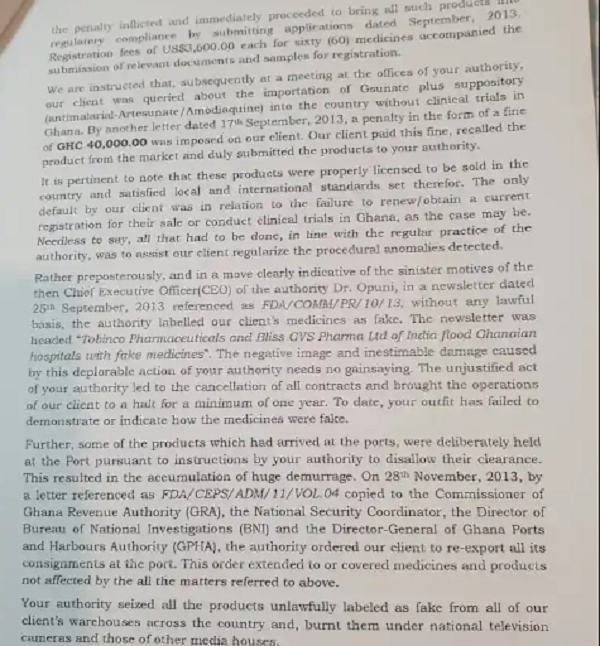
The paper’s findings had been that the FDA, is simply on its way to paying a dubious judgment debt it should have fought with the arsenals at its disposal, including documents authored by the FDA boss, Delese Darko.
Additionally, The Herald discovers that, although the issues Tobinco, led by Samuel Amo Tobbin, complained of happened in 2013 during the Dr Opuni administration at the FDA, he rather went to court in 2019, six clear years under the current Delese Darko administration and after Alhaji Hudu Mogtari.
Interestingly, Mr Tobbin, who has had various brushes with the FDA’s strict regulations, including the importation and distribution of Oxytocin used to induce labour or strengthen uterine contractions, or to control bleeding after childbirth, sought damages and interest on medicines confiscated from Tobinco Pharmaceuticals starting from 2015 during the tenure of Hudu Mogtari, who replaced Dr Opuni.
Remarkably, Delese Darko, who took over from Mogtari and had also been at the FDA long before Dr Opuni and Alhaji Mogtari, did not defend the institution’s actions.
Neither was Opuni and Mogtari subpoenaed by Justin Agbeli Amenuvor, FDA’s private lawyer, to give evidence in favour of the FDA to save the state from the GH¢93,905,760.79 million payment.
Strangely, the judgement suggested the FDA called only one witness, without giving his or her name, but said that during cross-examination, the witness “admitted that merely because a consumer experienced adverse effects from taking medications, it does not make the drug fake”.
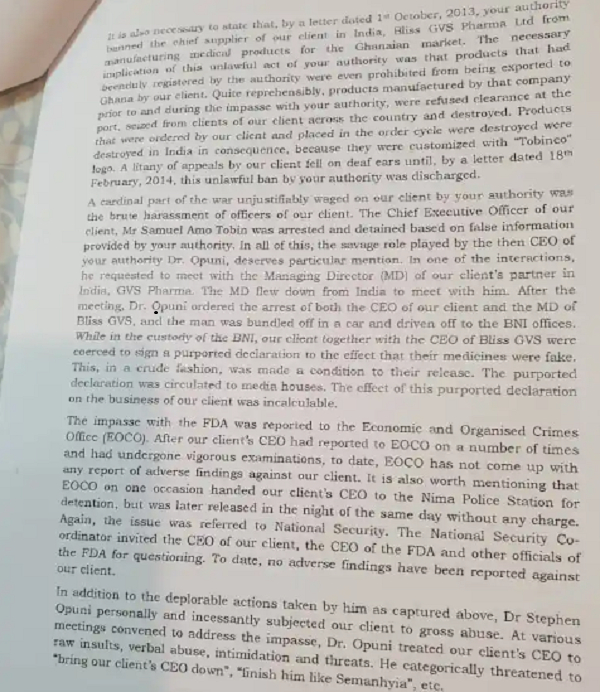
It is not clear, whether the various departmental heads some of whom are still in the employment of FDA and had taken part in the confiscation exercise of Tobinco’s unregistered drugs were in court to give evidence in favour of the state. Neither was it clear from the judgement that, the owners of Bliss GVS Pharma Limited, gave evidence in support of Tobinco.
However, in a bizarre twist to the matter, The Herald has sighted excerpts of a document prepared by Delese Darko, which revealed the confessions of Mr Tobbin when he was summoned to the FDA headquarters for questioning on the importation of “unregistered Artesunate/Amodiaquine suppositories into the country”.
A copy of the CEO’s document in the custody of The Herald said that “On the September 10, 2013 an invitation for a meeting at the FDA Head Office on the issues was extended to the Chief Executive Officer of the Company, Mr Tobin which he honoured.
“In the meeting with the Head of the Drug Enforcement Department, Mr Tobin admitted importing the unregistered Artesunate/Amodiaquine suppositories into the country.
“He also admitted that most of the products imported by the Company had expired registration, whilst others were never registered with the FDA.
“He, however, explained that the Management of Tobinco Pharmaceuticals had decided to manufacture all the imported products locally at Entrance Pharmaceuticals, a sister local pharmaceutical manufacturing company which was still under construction but was optimistic would soon be ready for production hence the reason for holding on with the registration of the products.
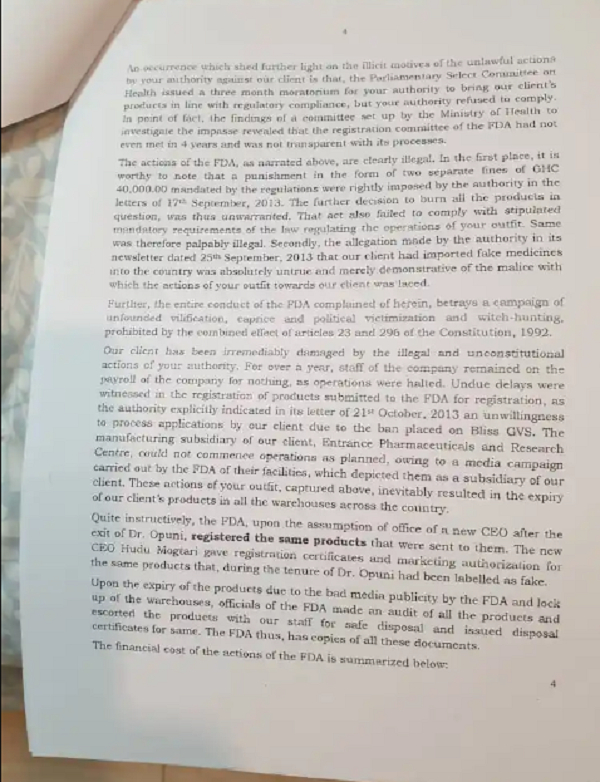
“Mr Tobbin was tasked to recall all the Artesunate/ Amodiaquine suppositories in the country and to initiate the registration process for the unregistered products”.
The Herald’s contact at the FDA revealed that so bad was Tobinco’s products that he was forced to ship back his unregistered and unwholesome products back to the country of origin.
This paper further learnt that the FDA got tired of destroying the unwholesome drugs and also feared polluting the environment with poisonous gases coming from the destruction of Tobinco’s medicines that it insisted on the shipment.
Furthermore, The Herald’s contact at the National Security Secretariat also known as “Blue Gate” or “Castle Annex” also revealed meetings that went on between Tobinco pharmaceutical officials led by Mr Tobbin, the CEO of Bliss GVS Pharma Limited, S.N Kamath and the FDA officials, where additional confessions were made by Mr Tobbin.
The meeting at the National Security Secretariat was presided over by the late Kweku Duah Dankwa, who was a deputy to Lt. Col Larry Gbevlo-Lartey.
The Herald information is that on September 2, 2013, a request was made by then Acting Deputy Chief Executive in charge of Safety Monitoring and Clinical Trials, Delese Darko, now FDA CEO of the Drug Enforcement Unit to carry out investigations on Tobbinco’s drugs.
Mrs Darko wanted the FDA to verify whether the unregistered product, Artesunate/Amodiaquine, was being promoted and distributed by the Plaintiff, Tobinco Pharmaceuticals.
Mrs. Darko also wanted the FDA to verify whether Doctors at the Kwesimintim Hospital were prescribing the unregistered products.
This was following a report received from a Pharmacist at Kraspect Pharmacy.
The report of Drug Evaluation and Registration (DER) dated September 6, 2013, showed that 48 of the 103 products were unregistered, 36 had expired registration, and 16 were pending registration. Only 2 had valid registration.
It is unclear if this critical information was provided to the court, especially as it was under the direct mandate of the current CEO.
A serialised media report had claimed that in 2014, the FDA confiscated pharmaceutical products imported to Ghana by Tobinco on the grounds that the products were unwholesome.
In 2019, Tobinco sued the FDA and asked the court to award costs against the FDA and declare its action as unlawful.
Tobinco, the plaintiff judgment creditor in the suit, was represented by Mr Philip Addison of Addison Bright Sloane, Barristers, Solicitors, Consultants, Accra.
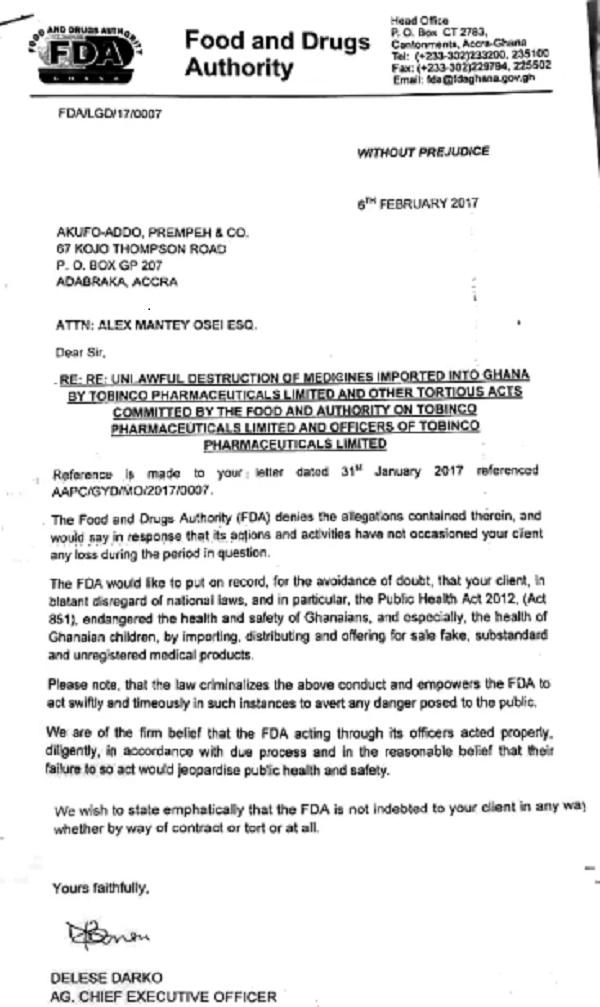
In reaching a decision, the court, presided over by Justice Audrey Kocuvie-Tay, declared that the wanton destruction of Tobinco’s unexpired products without obtaining any order from the court was unlawful.
The court again declared that “the unlawful lockup of Tobinco’s warehouses by the FDA and bad media publicity by the FDA resulted in the massive expiration of Tobinco’s products between June 2014 and August 2015.”
General News of Friday, 16 August 2024
Source: theheraldghana.com
Critical documents expose Tobinco, FDA and Akufo-Addo’s firm
 President Akufo-Addo, Delese Mimi Darko, CEO of FDA and Samuel Amo Tobbin, Group Chairman of Tobinco
President Akufo-Addo, Delese Mimi Darko, CEO of FDA and Samuel Amo Tobbin, Group Chairman of Tobinco
















